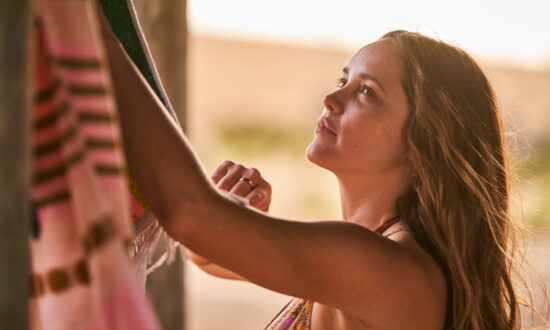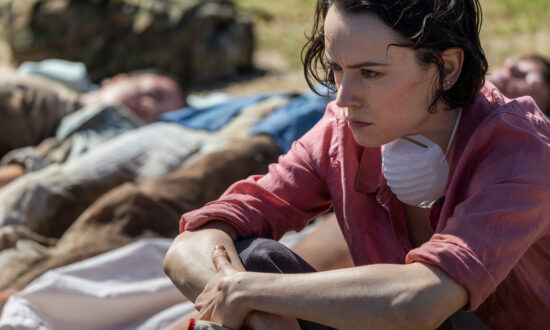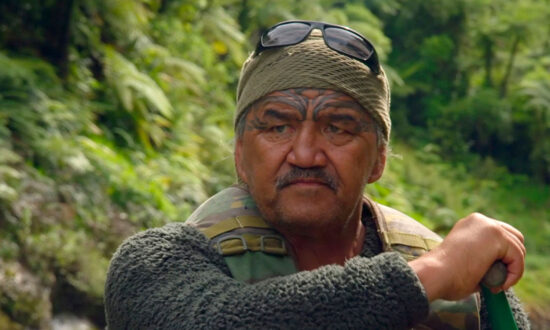If they can’t understand you, they’re not listening, an Irish grandfather tells his grandson in actor and director Kenneth Branagh’s acclaimed and very personal movie Belfast, which has its Australian premiere at the British Film Festival.
Branagh filmed the surprisingly joyful love letter to his home town in black and white and cast Judi Dench as his grandmother. It follows a family in Northern Ireland during The Troubles and stars Jamie Dornan as the charming, if shiftless, father.
British Film Festival program director Kim Petalas says Belfast is so powerful the audience he saw it with broke into applause at the end.
“Words can’t explain how good this film is, it is an absolute gem,” he says. “It is also an homage to cinema, it’s impeccably made with incredible performances, including the young boy who is 11 and plays the Kenneth Branagh of his childhood.”
The other highlight will be the first Australian screenings of Last Night in Soho, a time-warp fantasy starring Anya Taylor-Joy (The Queen’s Gambit) as a dazzling singer from the 1960s. The Swinging Sixties soundtrack (Dusty Springfield, Cilla Black) drives an unexpected story that builds in suspense as it goes.
“The way the film transports the character back to the 1960s is incredible. You feel as if you actually visit London in 1966 – it’s amazing,” Petalas says. “Then it turns on its head a little bit – it is wonderful.”
With a line-up that includes opening night feature The Duke, about a taxi driver who steals a Goya portrait from the National Gallery in London, this year’s ninth British Film Festival is the best yet, according to Petalas.
Not to be missed is the Australian premiere of Mothering Sunday, a period romance set in post-World War I England which puts actor Josh O’Connor (The Crown) up against the emerging young Australian talent Odessa Young (The Daughter).
“What a great performance – this film is going to catapult her to stardom. She is absolutely stunning in every scene,” Petalas says.
The program’s diversity says much about the depth of British film-making, which this year includes two war dramas: Terence Davies’ portrait of the English poet and soldier Siegfried Sassoon, Benediction, and Operation Mincemeat, based on the Allies’ efforts to outwit German troops in World War II, starring Colin Firth and Matthew Macfadyen.
The ’70s retrospective strand returns to the screen with Stanley Kubrick’s cult classic A Clockwork Orange, Peter Finch in Sunday Bloody Sunday and the still-nightmarish Straw Dogs, directed by Sam Peckinpah and starring Dustin Hoffman.
British eccentricity is alive and well although this year’s strongest contender, The Obscure Life of the Grand Duke of Corsica, starring Timothy Spall as architect Alfred Rott, is the work of Australian writer and director Daniel Graham. Apart from a meditation on the impermanence of life and the wonder of architecture, it is also vulgar and funny and includes Rott explaining with a straight face that his grand design does not resemble a woman’s vagina but is modelled on a promontory on the coast of Western Australia.
“It was my brother who pointed that out, not me,” Graham laughs via Zoom from the UK. “The film is made up of lots of different things I have heard or seen over the years that were odd things to say, and that was probably the oddest. It is actually the most southerly south-westerly tip of Western Australia and I can’t for the life of me think what it’s called, although it is really outstandingly beautiful.”
Graham, who grew up in Brisbane and lived in Perth and Sydney in 2017, directed Opus Zero, about an American composer in Mexico, starring Willem Dafoe. His latest is an equally ambitious story of an architect hired to build a mausoleum that intersects with stories about a leper, St Francis of Assisi and an outbreak of malaria on the island of Malta.
Graham says he deliberately placed grand themes side by side.
“I have put great beauty next to vulgarity, religiosity next to sexuality, exploitation next to generosity, and philosophy next to bawdy humour, to make a full world view,” he says. “Alfred saw all along that this Grand Duke, who isn’t even a duke, led this shallow, ridiculous existence, which is why he surrounded himself with ridiculous things.”
Although he wrote the part of Rott for someone else, he cannot imagine anyone else but Spall – who has halved his size and is now gaunt – doing it.
“Tim really was magnificent. He was for years the avuncular, heavy chap but he really is one of the great actors of his generation.”

Get InReview in your inbox – free each Saturday. Local arts and culture – covered.
Thanks for signing up to the InReview newsletter.
The festival is something of a celebration of Spall, who is in two other films, The Last Bus, about a pensioner who travels from Britain’s north to its most southerly point, using only buses, and It Snows in Benidorm, about a man forced into early retirement who visits his brother in Spain.
“Timothy Spall is a real festival favourite,” Petalas says. “The Last Bus is such a beautiful story of someone who makes a journey across England to deliver something. It’s very slow-moving and sombre, and a great character study.”
The British Film Festival runs from November 3 to December 1 at Palace Nova Eastend and Palace Nova Prospect in Adelaide. It is being presented simultaneously in other major Australian cities.
Support local arts journalism
Your support will help us continue the important work of InReview in publishing free professional journalism that celebrates, interrogates and amplifies arts and culture in South Australia.
Donate Here




